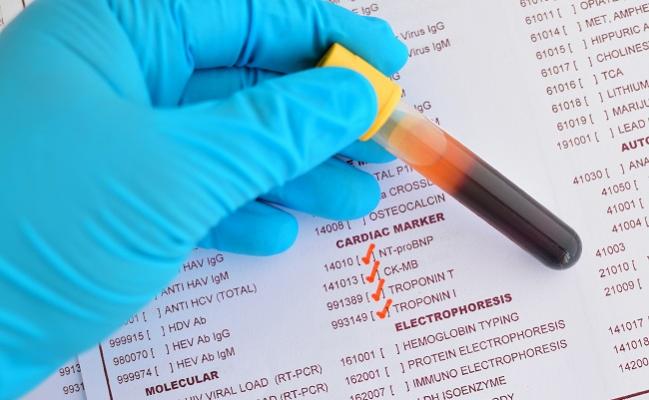CV Risk Higher With Modestly Elevated Troponin Levels, but Clinical Relevance Remains Unclear
One expert says clinical trials are needed to show that something can be done about the higher risk, now reaffirmed by a meta-analysis.

Even when cardiac troponin levels detected by high-sensitivity assays are within the normal range, elevations are associated with incident cardiovascular events in people without overt disease, a meta-analysis confirms.
In a pooled analysis including more than 150,000 participants, the risk of overall cardiovascular disease events was a relative 43% higher in those with normal troponin values in the top versus bottom third (RR 1.43; 95% CI 1.31-1.56), according to Peter Willeit, MD, PhD (Medical University of Innsbruck, Austria), and colleagues.
The relationship was strongest for fatal cardiovascular disease events (RR 1.67; 95% CI 1.50-1.86), but links were also seen for coronary heart disease (RR 1.59; 95% CI 1.38-1.83) and stroke (RR 1.35; 95% CI 1.23-1.48), they report in a study published in the August 1, 2017, issue of the Journal of the American College of Cardiology.
Adding information from high-sensitivity troponin assays to models that included conventional risk factors improved prediction of cardiovascular events, particularly fatal ones, suggesting a possible role for the tests in a primary prevention setting, the researchers say.
“The hope is that a marker like troponin could be used to identify people who have subclinical disease and it could help target preventive interventions,” Willeit told TCTMD.
No History of CVD, Yet Detectable Troponin Levels
Although cardiac troponins have been measured for years for diagnosing acute MI, the introduction of high-sensitivity assays—including just recently in the United States—has allowed for detection of very low levels, even in people without obvious signs of myocardial damage or cardiovascular disease. Indeed, 80% of the participants in this meta-analysis, all of whom had no history of cardiovascular disease, had detectable levels at baseline.
Numerous studies have identified a relationship between troponin levels and first-ever cardiovascular events in the general population, so Willeit and colleagues set out to provide an overall estimate of the association.
The meta-analysis included 28 prospective studies with a total of 154,052 participants free from cardiovascular disease who underwent high-sensitivity troponin testing. Most of the studies (17) involved measurement of troponin I, with the rest looking at troponin T. Troponin was detectable in a greater proportion of participants in studies testing troponin I (82.6% vs 69.7%). When asked about the most likely mechanisms to explain the link between modestly elevated troponins and cardiovascular events, Willeit pointed to subclinical coronary atherosclerosis, cardiac stress, and cardiac abnormalities that have not yet been detected.
Jennifer Ho, MD (Massachusetts General Hospital, Boston, MA), who wrote an editorial accompanying the study, told TCTMD that occult CAD is not thought to be responsible for the detected troponin in all individuals, although it probably is the source in most cases. Structural and functional cardiac abnormalities also play a role, she said.
That more than three-quarters of participants without obvious cardiovascular disease have detectable troponin is “pretty striking,” she added.
Should We Start Widespread Screening?
Despite the results, it would be premature to advocate high-sensitivity troponin testing in broad swaths of the population, according to Ho.
“Even though we see this very strong association of troponin levels with cardiovascular risk, it still is unclear and remains unknown how we would potentially modify that risk and how we would change our approach based on having a troponin laboratory value as part of your usual clinical assessment,” she said. “This study is important, and it certainly underscores the importance of knowing more, but I think we’re still very far from knowing clinically how to use this information to better prevent cardiovascular disease on a population level.”
Willeit agreed, saying more research, including meta-analyses with patient-level rather than study-level data, needs to be performed before making any recommendations regarding expansive troponin testing.
For her part, Ho said there are currently two things the medical community does not know. First, there are no primary prevention trials similar to those done for statins to show that targeting patients with elevated troponin levels can improve outcomes. There’s also uncertainty about the source of the raised troponin levels in people without clinically apparent disease.
“We used to think about troponin as sort of a dichotomous test that either comes back positive or negative, and if it comes back positive your patient is having a heart attack and if it comes back negative they’re probably low risk,” she said. “I don’t think we can think about that in the same way anymore, number one, because the assay is so much more sensitive. Number two, if we take it out of the clinical context of, for example, a chest pain rule-out MI situation and we apply it broadly to a population, I think we have to be careful about what that might mean biologically and whether that can help target our preventive efforts.”
Todd Neale is the Associate News Editor for TCTMD and a Senior Medical Journalist. He got his start in journalism at …
Read Full BioSources
Willeit P, Welsh P, Evans JDW, et al. High-sensitivity cardiac troponin concentration and risk of first-ever cardiovascular outcomes in 154,052 participants. J Am Coll Cardiol. 2017;70:558-568.
Ho JE. High-sensitivity troponin in the general population: time for a new normal? J Am Coll Cardiol. 2017;70:569-571.
Disclosures
- Willeit reports receiving support from an Erwin-Schrödinger-Fellowship sponsored by the Austrian Science Fund and from the excellence initiative (Competence Centers for Excellent Technologies) of the Austrian Research Promotion Agency FFG.
- Ho reports receiving support in part from the National Institutes of Health and a Massachusetts General Hospital Hassenfeld Scholar Award.


Comments